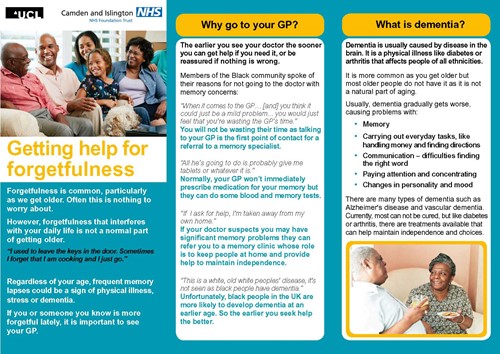Black African and Caribbean elders develop dementia more often and earlier than their white counterparts, but access dementia services later in the course of their illness and often in response to crisis. Their involvement in research and treatment uptake for dementia also seem to differ from the majority of the population.
Timely diagnosis and help-seeking for dementia is recommended globally, as it allows access to therapeutic treatments and interventions which are more effective in the early stages of the condition. Timely diagnosis of dementia also facilitates access to health and social care, prolongs independent living, and allows patients and carers to maintain good quality of life for longer while reducing crises and costs associated with delayed help-seeking behaviours.
We know that cultural factors about health and ageing influence how people respond to dementia and whether or not they access services. This project led by UCL in collaboration with Camden and Islington NHS Trust set out to understand how black families respond to memory problems, a possible sign of dementia and what prevents them from seeking help from healthcare professionals when they first notice symptoms indicative of dementia.
The project involved multiple qualitative interviews with 50 black adults with various socio-demographic characteristics and from different backgrounds to identify the barriers and facilitators to seeking help for dementia. It used people’s responses to develop an intervention specifically tailored to a black audience. The intervention was then refined by incorporating feedback and comments from dementia patients, carers, volunteers from the public, clinicians and experts in the treatment and research of dementia.

 START DATE AND DURATION: April 2014
START DATE AND DURATION: April 2014
 Bites
Bites

 Publications
Publications
 Videos
Videos

